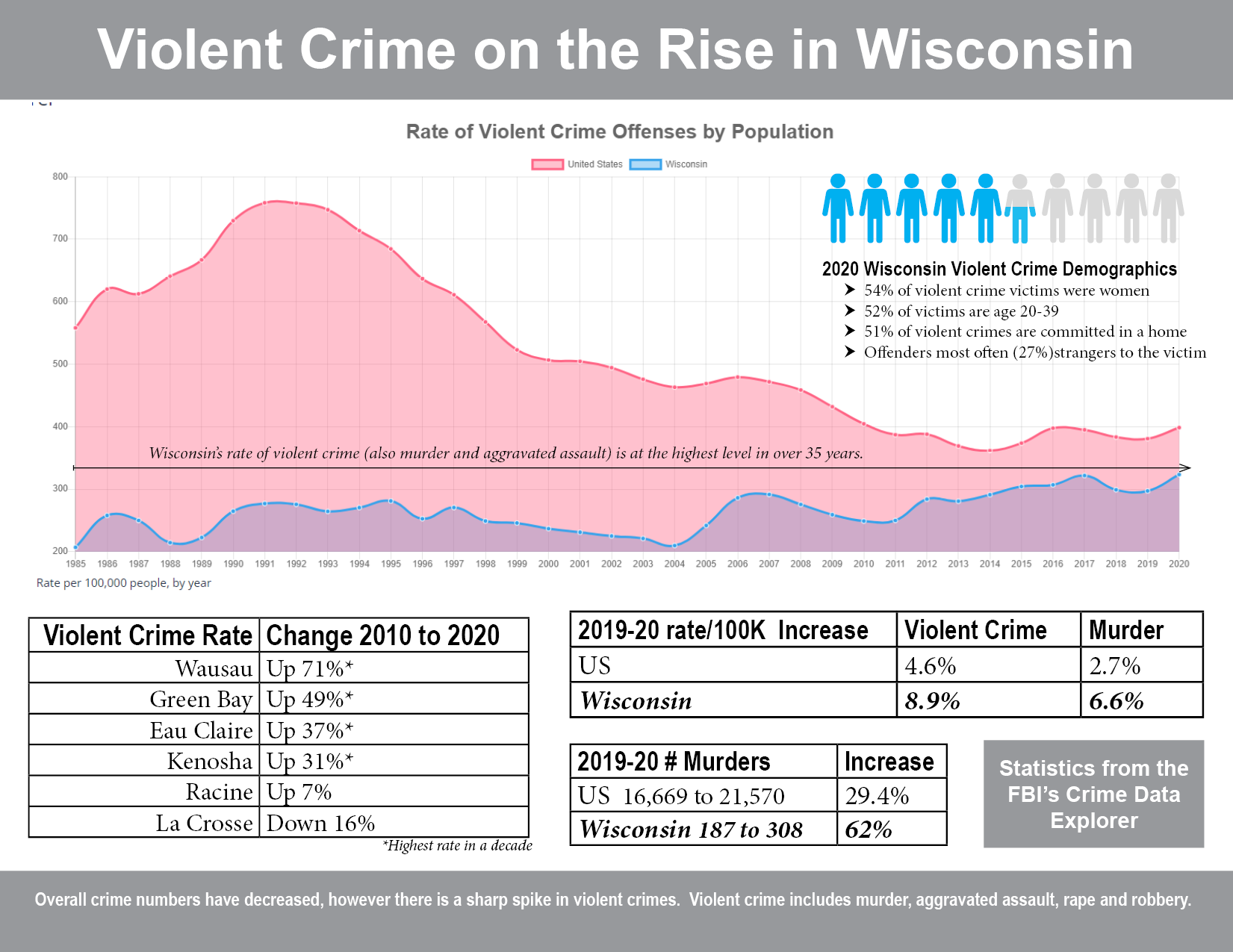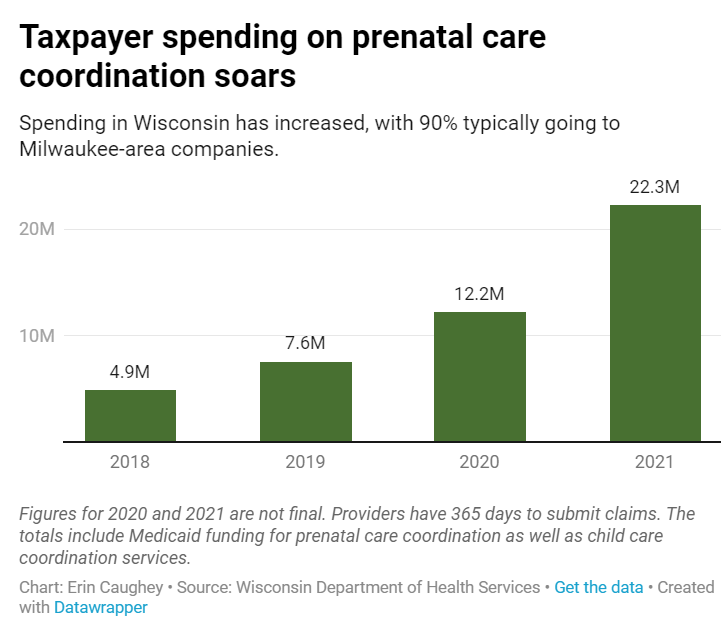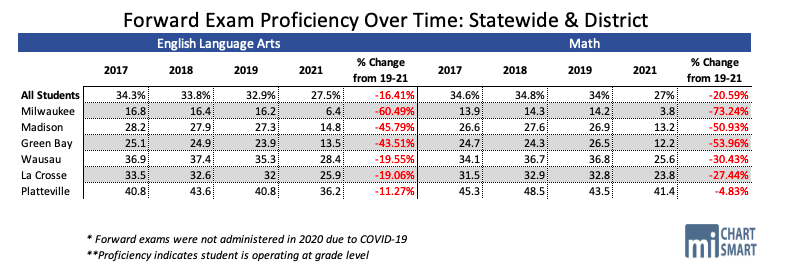
What do Evers’ agency budget requests say about his plans to get the state heading in the right direction?
Not much.
The Evers Administration agencies have released their 2023-25 budget requests and as expected, they are asking taxpayers, struggling with the highest inflation over 40 years, to pay more to run government as well. So far, the requests top $7 billion in new spending, much of which was requested by Superintendent of Public Instruction Jill Underly, despite the fact that as of this spring, 83% of the $2.4 billion in federal pandemic funds had not yet been claimed by Wisconsin schools.
It has become popular on the left to say “budgets are value statements” as a means to attack anyone who opposes their tax and spend agenda, and as a full-throated defense of dumping funds into the new woke and divisive program du jour.
Budgets are value statements. They measure how much governments value the taxpayer. How much they value the inherent wisdom of smaller government and bigger family budgets. They measure how much we value effectiveness and efficiency. They measure how much we value fundamentals like public safety, a quality education, individual rights, honoring veterans, and the importance of work.
The agency budget requests released this month by the Evers Administration show they value the status quo – but want more money to keep doing the same things.
Agency requests are often characterized as bureaucrat wish lists, but this falls somewhat wide of the mark. Cabinet agency budget submissions are developed with hands-on input from the gubernatorial appointees who lead agencies, and in consultation with the governor’s office. They’re more accurately a first draft. You won’t see something in one of the cabinet agency budget asks that the governor could never support.
Coming as these do, in the heat of the gubernatorial campaign cycle, the cabinet agency submissions could have laid out an argument that the governor understands the biggest challenges facing the state, and that he has policy solutions in mind to solve those problems. These first drafts of a potential Evers budget could show that he understands where their administration fell short, and what he will do to correct course.
These budget submissions don’t do that.
People in the state are concerned about inflation eating away at their ability to make ends meet, about the skyrocketing violent crime rates that are making communities less safe, and about if -and what – their children are learning in schools.
They expect government to function – get licenses issued, get unemployment checks in the mail, keep dangerous people locked up, prevent tax dollars from being wasted on fraud and abuse of programs, share accurate data with the public, take care of veterans, make sure that elections are managed with integrity and consistency, and that kids are taught the 3 Rs and not indoctrinated into a “movement.”
These budget submissions don’t give ordinary Wisconsinites hope that Evers wants to right the ship; they are a love letter to Evers’ hard-left base, in hopes they will turn out in enough force to give him another term.
We’ve compiled a list of the Top 10 ways Wisconsin had gotten on the wrong track under the Evers Administration, and what the agency budget submissions do – or don’t do – to get us back on the right track.
Scold and Release
Evers and Barnes ran on a platform of releasing half the prison population. They weakened the conditions of extended supervision of convicts finishing their sentences in our neighborhoods, and they tried to overhaul the criminal code, undoing Truth-in-Sentencing reducing sentences. They both fanned the flames of BLM agitators, using anti-police rhetoric instead of urging calm in the face of riots and violence. And Evers rejected help from the federal government to control riots, later under-deploying our National Guard.
Evers appointed a parole commissioner, John Tate, who was deeply committed to Evers’ goals of getting criminals out of jail. Evers’ Parole Commission approved an average of 132 discretionary paroles per year in his three and a half years; Walker’s average over 8 years was just 83 per year. Though Evers is now gaslighting, pretending he has no say in paroles, he in fact intervened in the parole of a convicted murderer (after it became a PR problem) and asked his parole commissioner to reverse the decision. Then, he threw Tate to the wolves in the runup to the election, asking him to resign and scapegoating a Black man for doing exactly what Evers expected.
The Evers Department of Corrections (DOC) released nearly 1,600 inmates between March and May 2020 who had violated the terms of their release. Evers pledged to stop making criminals serving out their sentences in the community abide by basic rules, and his DOC got to work, reducing revocations by nearly half.
DOC is also changing the language used referring to the convicted criminals incarcerated for protection of the public– they now refer to them as PIOCs, “persons in our care” so nobody feels bad about being a criminal.
Evers has now granted the most pardons of any governor in Wisconsin history – over 600 convicted felons previously barred from possessing guns may now legally be armed, thanks to Evers, who apparently feels like felons with guns are not dangerous, while law abiding folks with guns are. One of the people Evers pardoned has already been convicted of a firearm violation.
The legislature sent a host of tougher on crime bills to Evers, and he vetoed bills that would have limited early release, probation, and extended supervision. Wisconsin is in the midst of a violent crime spike, and the governor is working hard to keep it going.

We have yet to see Evers’ proposals related to crime, but he has been immovable in his commitment to Scold-and-Release. His DOC’s budget’s only real nod to public safety is a small increase in funding for GPS monitoring of “clients,” who are more commonly known as “sex offenders” by the general public, and an even smaller amount to help recruit staff.
Unemployment Insurance Program Failure
Evers’ management of unemployment benefits during the pandemic put many families through the wringer. Evers’ Department of Workforce Development (DWD) made a name for Wisconsin as among the worst states in all aspects of getting unemployment benefits into the hands of families who lost their jobs because of the shutdowns.
The DWD call center answered less than one percent of the 41 million calls made to the agency in the initial months of pandemic job losses. DWD couldn’t get checks the out the door, or in the right amount. Nearly a third of first payments were delayed over 70 days, and the average delay was over 90 days – one of the slowest responses in the nation, as was our overpayment rate of 27%.

When Wisconsin families were reeling from the loss of jobs, income and opportunities, the system that was in place to help fell apart under Evers watch.
As he did with his parole commissioner, Evers fired his bumbling DWD cabinet secretary.
Does the DWD budget submission set a new course? They’re looking to expand Family Medical Leave, increase regulation of employers and add a position in the Equal Rights Division to “perform outreach” so, it doesn’t look like they plan any budget initiatives to improve agency performance.
Licensure Backlogs
Again, people expect basic government functions to be executed in an efficient and timely manner – things administering unemployment funds and issuing required licenses.
DWD’s UI performance was a dismal failure, and licensure is arguably worse. Evers’ Department of Safety and Professional Services (DSPS) has been under fire for delays in issuing licenses across the board, most problematic in high-demand fields like health care where the state is facing serious worker shortages.
Applicants have waited months, some more than a year, for licenses to be issued. There is a backlog, but DSPS has been unable to say how big the backlog is or how long it will take to eliminate it, but the average wait time was 80 days last year, with many waiting much longer. Evers communicated regularly with the department but unbelievably they never discussed the massive licensure crisis.
Last month, Evers’ DSPS Secretary Dawn Crim left her post in the midst of this crisis.
The DSPS budget submission asked for 72 more staff to meet “growing obligations” (although it is unclear how their responsibilities have grown) and additional funding for technology upgrades. But coming from an agency that has no idea how big their backlog is and has presented no analysis of why they cannot meet their basic responsibilities and what would enable them to do so, it’s not clear whether staffing is the main problem, or if more bodies and different technology will solve the problems.
Welfare Exploitation
While unemployed couldn’t get UI checks, and professionals couldn’t get licenses, and employers couldn’t get workers to fill jobs, Wisconsin’s DHS added over a hundred thousand able-bodied, working-age, childless adults to the Medicaid rolls, paid millions to fraudsters who scammed both Medicaid and expectant moms, and has not published a report of outcome measures from the Office of Inspector General (OIG) in 3 years.
The Biden Administration continues to keep the pandemic emergency order in place (though the president has personally said the pandemic is over) which financially penalizes states that remove people from the Medicaid rolls who are no longer financially eligible. Evers’ DHS has not been taking proactive steps to redetermine eligibility and regularly notify and remind the people who remain on MA even though they no longer qualify that they will eventually need to move to the affordable care exchanges. The department prefers to wait until after the emergency is lifted to start that process which means our bloated welfare numbers will stay high, at taxpayer expense, for months.
DHS Secretary-designee Karen Timberlake says it’s been tremendously important for the state to continue to cover ineligible people in a program meant for the needy. And of course that gloom-and-doom approach how the mainstream media is covering it – even though those ineligible people would have access to often no-cost Silver plans on the exchanges.
Over 25% of the state is on Medicaid now, while under 11% of the state is in poverty. Wisconsin has about 2 employed wage earners for every Medicaid recipient, but the welfare junkies on the left want to keep the number of recipients high, even if it means making taxpayers pay to keep people who do not qualify on the welfare rolls.
Earlier this year, it was revealed rampant fraud in the department’s prenatal care coordination designed to reduce infant mortality, particularly in the Black community. Evers quadrupled the money spent on the program without fraud safeguards in place and predictably, fraud exploded. A year after the DHS OIG referred at least one case to the Department of Justice, no charges have been filed.

The DHS budget submission requests billions in new spending in MA for increased caseloads – hardly surprising since we now are covering both eligible and ineligible people – with the addition of thousands more who would be covered under their proposed Medicaid expansion. The budget requests is focused on moving more able-bodied, working- age people into welfare, not into the workforce.
Deteriorating Care for Veterans in State Veterans Home
During Evers’ time in office, family and residents at the Union Grove Veterans Home have been sounding alarm bells about the deterioration of care at the facility. During the pandemic when the Evers Administration forced closures of schools, businesses and churches, a veterans’ home he and his appointees controlled was cited repeatedly for failing to take precautions against the virus – even though the elderly were most at risk, and the veterans there deserve the best the state could offer.
But they didn’t get the best. Union Grove has among the worst record of violations and fines of all veteran homes in the nation. The citations and fines started climbing when Evers took the helm. Families complained of poor infection control, poor wound care, over-medication, dehydration, unexplained injuries, and some said it was like a POW camp. Evers Department of Veterans Affairs (DVA) Secretary Mary Kolar told them they could leave.
Just like the Evers Administration is praising our schools when kids aren’t learning to read, they’re also Affairs touting our veterans’ homes as among the best in the nation, while they’re racking up citations and fines.

Evers turned down an offer of help from the federal government in 2020, in a similar rejection of federal help offered by the Trump Administration ahead of the 2020 riots. When asked to balance public safety and potentially saving lives against allowing a partisan enemy to possibly get credit for lending a hand, Evers chose to put lives at risk.
The DVA budget request? In June, Evers said his agency has failed veterans blaming a lack of “adequate staff and adequately trained staff.” But his appointee Kolar’s budget plan continues the same staffing, overtime and pay differential patterns that are failing to provide adequate care.
In Kolar’s cover letter for the budget submission, she says the budget is “necessary for enabling the department to continue its critical mission of delivering top benefits, programs and services to Wisconsin veterans” yet she paid so little attention to her budget submission that she failed to notice that the document “anticipates” the opening of a facility in 2021, in a page that was copied word-for-word from their 2020 budget submission.
That’s a strong message to veterans and their families that Evers DVA won’t be bothered to do anything to address the crisis in our veterans’ home except cut and paste.
Transparency
One of the first things Evers did when taking office was to take down all the agency performance dashboards instituted under the Walker Administration. And the Evers COVID money dashboard is a shadow of the transparency dashboards in other states.
The DHS dashboard tracking COVID data was deeply scaled back, so users can no longer to track information like whether the agency was making good on a promise to better track COVID deaths in the state’s nursing homes. Evers said good tracking didn’t matter, and then he shut down the public’s access to the data.
The lack of functional dashboards means the public is forced to make – and wait for – open records requests of the agency to learn what is happening in programs.
There seems to be no evidence in the agency budget submissions the administration intends to correct these deficiencies and move to more transparent government that makes public information readily available.
Woke Language
The Evers Administration wasted no time spending tax dollars to appease the anatomy deniers on the left. He ordered the state’s birth certificates to be revamped to include a gender-neutral option for mothers and fathers who find it upsetting to be called mothers and fathers. Now there are four options to choose from, mother, father, parent, and parent giving birth, which can be mixed and matched like Garanimals.
Another executive order required all state agencies to remove ‘gendered’ terms from all documents, websites and other public-facing materials, or redraft so they are not required. So gendered pronouns and familial relationship that include a gendered term are to be removed and replaced with generic words like sibling, parent, grandparent wherever possible. It’s not clear what the administration is using for aunt, uncle, niece, or nephew, but some of the woke word-inventors suggest terms like “pibling” for aunt/uncle and “nibling” for niece/nephew, so those could be unexpected and incomprehensible additions to government documents.
None of these changes required legislative approval although the change to all state documents would bear a massive price tag, Evers didn’t need budget authority to do it. There is no indication in the budget submissions that he plans to reverse course on using imprecise and inaccurate words in government documents.
COVID Response
As we all remember, Evers handed responsibility over to his DHS Secretary, Andrea Palm, at the beginning of the pandemic, and never looked back. Closing schools, places of worship and (some) businesses, our economy went in freefall, and his agencies couldn’t get unemployment checks out to the people they put out of work.
Schools closed, some went virtual, some lacked the technology to do so, and – as we’ve seen, children suffered. Proficiency scores have plummeted. The federal government sent billions to Wisconsin schools, and most of it has not been claimed, yet schools are crying poverty.

Meanwhile Evers is fiddling while children fail, bragging about the performance of schools in campaign ads – praising a system where a third of students are unable to read or do math at grade level. Those same campaign ads claim Evers values parental involvement, obvious gaslighting since when he was sent a ‘parents bill of rights’ guaranteeing parents involvement in, and information about, their child’s education, he vetoed it.
The DPI budget submission requests $2.5 billion in new spending, and Superintendent Underly’s State of Education Address last week showed her focus is more on pronouns than proficiency.
Petty Partisanship
We fact-checked a recent Evers campaign ad rewriting his bio as one of a guy who – despite a quarter century of waging campaigns for statewide office – never even thought about politics, nope not once.
The truth is Evers is a practiced partisan, so polished some people actually believe the ‘aw-shucks’ schtick – and takes his partisanship to petty extremes – even to the detriment of the state.
He has been unable to say why he vetoed some bills, and his veto messages on others indicated he never actually read or understood the bill. Right out of the gate, he vetoed a Republican bill to responsibly cut taxes for the middle class – something he had promised in his campaign – because it used a surplus…fast forward to his reelect, and he tried to call the legislature into special session weeks ahead of the election to pass a proposed a tax cut…using the surplus. He vetoed hosts of proposals from the legislature solely because he did not want to take their advice on how to spend the billions of federal pandemic dollars that flowed into the state. He dodged meetings with legislative leaders then bizarrely called them sexist. Within weeks of taking office he booted more than 80 citizens from their appointments to councils and boards.
With budget requests containing repeatedly rejected spending proposals, it’s clear that the plan, again, is to use the budget as a vehicle for partisan talking points, not serious policy initiatives.
Election Integrity
Finally, with the election just weeks away, there are many unresolved concerns about election administration.
WEC is being taken to court on multiple fronts because partisan gridlock stops the commission from acting to protect election integrity. The legislature sent numerous election integrity bills to the governor, with an eye to restoring belief in the integrity of elections. Even bills as clearly necessary as one to prevent private groups from paying municipalities that sign contracts allowing outside input into election activities were vetoed.
So strong is his partisanship that Evers actually engaged in voter suppression, deliberately scheduling an election in Northern Wisconsin over a holiday, on a timeline that violated federal protections of military voting rights.
The WEC budget submission is not prepared by the Evers Administration, and their main ask, an Office of Inspector General, merits some consideration regardless of the future of the commission. Evers though has opposed efforts to restore election integrity at every turn, so a change of course in a potential Evers 2023-25 budget is unlikely to the point of impossibility.
The past three years have been filled with mismanagement and incompetence from the Evers Administration, and cabinet agency budget submissions give us a window into what they have planed for a second term. Based on what we’ve seen so far the answer is: more of the same.